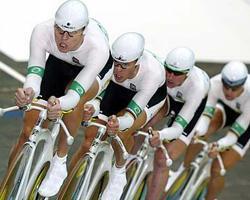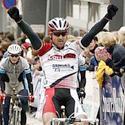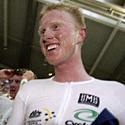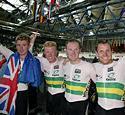
Recently on Cyclingnews.com |
World Track Championships - CM
Stuttgart, Germany, July 30 - August 3, 2003
Big talent pool keeps Australian pursuiters keen for the team
Six Australians contribute to Stuttgart performance
 |
One of the highlights of the 2003 World Track Cycling Championships was the performance of the Australian team pursuit squad, which smashed its own world record set in 2002 by over two seconds.
The young Australians showed that significant improvements in track cycling's premier endurance events are still possible. They also demonstrated the benefit of having strength in numbers as there are up to 10 riders vying for places in the pursuit squad.
It was the final quartet of Graham Brown, 24, Peter Dawson, 21, Brett Lancaster, 23, and Luke Roberts, 26, that covered the four kilometres of the team pursuit final in 3.57.28, well under the mark of 3.59.583 set by Australia at the Commonwealth Games in Manchester in 2002. (The four-minute barrier for the team pursuit - considered one of the milestones in track cycling - was first broken at the Sydney 2000 Olympic Games by Germany.)
Among the riders who contributed to the Australian pursuit squad's gold medal success were Ashley Hutchinson, who rode the opening round in Stuttgart and Stephen Wooldridge, who, because he lined up in two of the team's three rides, also received a world champion's medal and jersey. "They helped get us to the position of riding for gold and can't be forgotten here," said Luke Roberts. "Having others pushing you along means you perform to your maximum ability and Ian's made that happen."
 |
Many of the Australian endurance track riders are also on the road for the majority of the year at the elite level, as Brown and Lancaster - sprinter and lead-out man, respectively - are with Italian squad Panaria - Ceramiche and were very active in this year's Giro d'Italia. Roberts, meanwhile, is with German-based Team Comnet-Senges and he finished third on GC in the five-stage Ringerike GP in Norway earlier this year.
Lancaster was the only member not in the 2002 world record foursome and he came in to replace Mark Renshaw, who had a conflicting race schedule in Stuttgart with points, scratch and the Madison, where he teamed up with Brown.
The riders also highlight the importance of specific training set out by Australia's track endurance coach, Ian McKenzie. "Ian's come in with new ideas and is helping us by working on our individual strengths which then helps the whole team go faster," Roberts said. "Now we're getting numbers coming through and we've got ten guys we could line up here who could medal."
Secrets to their success
McKenzie believes the secret to improving the Australian times even further is the depth of talent vying for selection, although he was reluctant to give too much away at the post-race press conference.
"It's a secret," he said of the Australian preparation before conceding to give a vague description of how the program operated this year. "It was very similar to past years in that we come together to do World Cups with various riders at various locations in order to qualify for worlds."
"Then for a short period before the championships we gather everyone for an intensive training session (at Buttgen in Germany)," said McKenzie, noting the team had also practised false starts just in case it happened.
"Our aim is to go to Athens with the best team available so sure these guys (the six from Stuttgart) will be part of it but a couple of others are trying to force their way into the team so we'll see what happens," McKenzie added.
Déjà vu at start
It was a coincidence the team did practice false starts, as the final was not all smooth sailing. Lancaster found himself on the track moments after the first attempt at a race start.
"Brownie's bike took ages to get into the start gate and I'd been sitting in the saddle a bit too long so when we went I pulled my wheel (rear disc popped out of the forks) but lucky it happened then and not later," said Lancaster, who appeared to crash in slow motion. "I thought I'd better come down because I didn't know what the rules were like and if you crash you're safe."
 |
It was 'deja vu' for the Australians, because in last year's gold medal ride for world honours Dawson caused a false start for the team. In Stuttgart, the UCI commissaries ruled a false start due to mechanical failure and allowed a restart. Brown later suggested the mishap may have been a good thing because it settled their nerves and helped them refocus. Minutes later the teams were back on the start line and this time both got away cleanly.
The British team moved strongly out of the gate and were equal with the Australians after 500 metres but from then on Australians pulled away. At the halfway mark the British team was half a second down and then Bryan Steel pulled out, spent from his early effort. The British continued to ride well with only three but on the other side of the track the Australians were competing against the clock.
"Just after two kilometres we saw their guy out and knew they would be under pressure and slowing down," said Roberts, who has repeated his medal performance of 2002 with this gold and a silver on day one in the individual pursuit. "We were confident and a bit relieved then but Macca (coach Ian McKenzie) started signalling we were going further in front and he was signalling 'go go go!' so we just brought it home to see if we could take the record.
"Once Ian got really excited I knew we had a good time because it's not often he gets that excited," said Roberts of the national endurance coach who is renowned for his poker face and composure in tense situations.
"I couldn't believe they'd lost a rider so early but I didn't think about it after that or about the world record I just pushed through my turns as hard as I could," said Dawson, who pulled out with two and a half laps of the 285 metre track remaining having done the job he was assigned. "I can't explain what went through my head when I saw the time we were on - it was so emotional."
 |
McKenzie's composure cracked however when the team was heading into the final lap and the coach knew they were on the brink of not just beating but demolishing the old mark. The vocal German crowd also knew they were witnessing history in the making and rose to urge the Australian's home.
"The crowd was awesome and we could hear them in the last couple of kilometres," said Roberts. "Either it was a really close race or we were really fast but regardless their response helped us.
"Most of us have one or more world championship gold medals so the next step is definitely Olympic gold in Athens," said Roberts.
"Martin Barras, the sprint coach, told us research for Athens has the winning time at 3.55 and actually I told him he was an idiot but if we've just ridden 3.57 and six other guys are pushing us to keep us uncomfortable and not relaxed in our positions on the team then when we get to Athens we'll have the four best guys and anything's possible," said Brown.
German media sought a reaction from the Australians to the absence of a German pursuit team that was withdrawn due to infighting (see separate story). The German squad is the only other team to have ridden under four minutes and are also reigning Olympic champions and 2002 world silver medallists.
"It made interesting reading in the newspapers but had little effect on us," said Roberts. "We might have gone even faster with them in the final," Brown chipped in.
